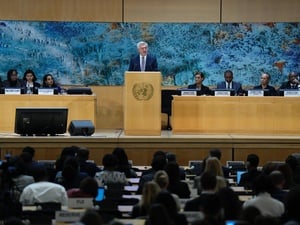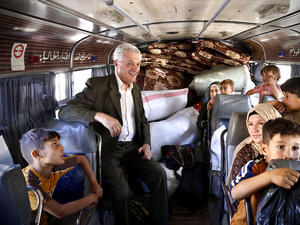High Commissioner's Statement to UN Security Council Arria Formula Meeting
High Commissioner's Statement to UN Security Council Arria Formula Meeting
Thank you, State Secretary, and thank you very much to Switzerland and Mozambique for inviting me to participate in this discussion, but even more importantly, to allow us humanitarian agencies that are on the same frontlines that you are dealing with in the Security Council to make our voice heard on this very important subject.
Allow me to offer some remarks from the UNHCR perspective, and building on the very important observations already made by Cathy [Ms. Catherine Russell, Executive Director, United Nations Children's Fund (UNICEF)] and Robert [Mr. Robert Mardini, Director-General of the International Committee of the Red Cross (ICRC)].
Conflict and attacks on civilian infrastructure, which have already been mentioned, including water of course, have a devastating effect also on millions of the 103 million people forcibly displaced around the world. This is why it is so important that water issues be brought to the attention of the Security Council.
Such attacks, no matter in what stage of forced displacement, compound suffering and deprivation and lead to further hardship, and many times, onward movement of people.
Take for example, the attacks on civilian infrastructure like I saw on my recent visit to Ukraine, and that I have seen indeed in many other places around the world. Attacks that leave people exposed and vulnerable. Leave them without water to drink or cook or bathe their children in. When life’s most basic necessities are taken away, people often have little choice but to flee.
And yet even in exile, the displaced frequently struggle to access clean water and safe sanitation. Some, mostly women and girls, are also often required to travel long distances to reach water, exposing them to further violence, including, sadly sexual violence.
While conflict is the primary cause for displacement, as I have said myself here in the Security Council, the climate emergency is also driving people from their homes, often in a combined pattern. As resources, especially water, become scarce, competition grows and this can lead to conflict. I have given this example already this morning but let me repeat it, that violence, for example, erupted in recent years in northern Cameroon between herders and farmers who were forced to share ever-evaporating water sources in the Lake Chad area, displacing thousands. Equally concerning are places where people are in need due to the climate emergency – like in Somalia, for example – but where aid cannot reach them because of conflict and related access constraints.
UNHCR is with the displaced in their countries of origin and their countries of asylum. We will continue to provide help and assist them, as well as the communities and governments that host them.
But we must not forget that most refugees want nothing more than to go back home, and the international community must also work together to create the conditions for people to return in safety and dignity. Unfortunately, lack of services in countries of origin often inhibits this solution to displacement.
Think of South Sudan for example, where a fledgling peace agreement has enabled, nevertheless, over 600,000 already to take the difficult decision to return home, even to locations where conditions are still challenging. Yet how sustainable can that return be if there are no services, or even water to drink, wash, or cook with? It is therefore imperative that basic services, including and especially water and sanitation, are scaled up in countries of origin to make repatriation the best solution for any refugee, more dignified and sustainable, and often a crucial contribution to peace and security.
We all know how critical water is to life, and I am so glad that the Council – under your leadership – has decided to focus today’s event on this issue.
I want to once again echo the comments from my good friends at ICRC and UNICEF who highlighted the importance of respecting International Humanitarian Law and ensuring gender-sensitive services to women and children, who make up most of the displaced people around the world.
Most of all, naturally, and as we humanitarians often repeat and will keep repeating, it is very important, most of all, that the Security Council redoubles its efforts to prevent, manage and resolve conflict around the world, finding renewed unity to achieve that. Meanwhile, it is important that the Council helps us ensure that more is done to allow humanitarian assistance, early recovery, and reconstruction in places where it is possible. And in keeping with the focus of this meeting, it is essential that these efforts include the protection, access to, and rehabilitation of vital water services.





